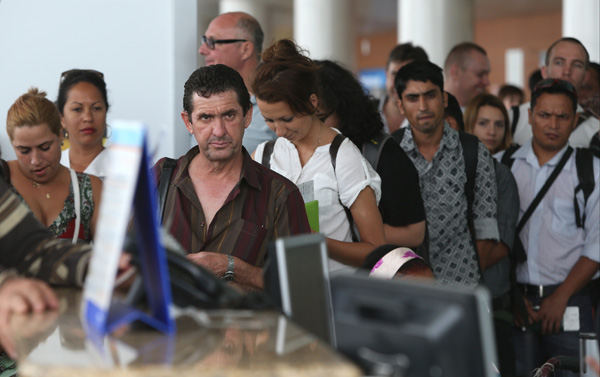Russia says it's in 'tough spot' over Snowden
-
- China Daily/Agencies, June 29, 2013
|

|
|
Passengers wait to check in for Aeroflot flight SU150 from Moscow to Havana, at Sheremetyevo Airport in Moscow on Thursday. Journalists stayed in the transit zone of the airport as yet another Havana-bound flight left with no sign of Edward Snowden.[Agencies] |
Russia on Friday accused Washington of putting it in a "tough spot" by claiming it had failed to disclose revoking the passport of fugitive US intelligence leaker Edward Snowden prior to his arrival in Moscow from Hong Kong.
The diplomatic rhetoric around the explosive case of the 29-year-old former US National Security Agency contractor escalated when Washington blamed Hong Kong's government for letting Snowden out in the first place.
The fate of Snowden himself remained in limbo for a sixth day on Friday as he remained holed up in the transit area of Moscow's Sheremetyevo Airport without making any contact with the swarm of international reporters at the scene.
Meanwhile, Washington appears to be trying to demote Snowden's status to that of a common fugitive unworthy of extraordinary pursuit.
US President Barack Obama has referred to Snowden as a "29-year-old hacker" during a visit to Africa, saying on Thursday that Snowden's case was "not exceptional from a legal perspective".
The government of Ecuador - Snowden's most likely place of exile should he avoid arrest for lifting the curtain on the scale of the US global surveillance program to the media - said that it had not yet processed Snowden's asylum application.
But Venezuelan President Nicolas Maduro - who will coincidentally be in Moscow on Monday for an energy summit - reiterated late on Thursday his offer to grant a safe haven to the US fugitive.
However, a Russian official close to the matter on Friday told the Interfax news agency that Washington had deliberately put Moscow in a difficult position, claiming it never reported that Snowden's passport had been revoked and that he was banned from travel.
He said Moscow might not have allowed Snowden to fly to Russia in the first place had it known about his travel problems.
"Washington deliberately put Moscow in a tough spot by having failed to inform it of the fact that his passport was annulled in time," the source said.
"The Russian authorities were informed of this post-factum, more than a week after Snowden was stripped of his passport. If this fact had been known in advance, then possibly Mr Snowden might not have flown to Moscow and this entire story might never have happened."
Russia and the US do not have an extradition treaty and Moscow has thus far refused to hand over Snowden to Washington.
This refusal - expressed personally by President Vladimir Putin earlier this week - has added to diplomatic tensions between Moscow and Washington that have existed due to the Syria crisis.
Venezuela offers shelter
The Russian source said Snowden will only be able to leave the Moscow airport after a country such as Ecuador or Venezuela offers him political asylum.
"On these grounds, he will legally leave the territory of Russia, without ever having crossed its border," the official said.
Snowden has applied for political asylum in Ecuador and was originally scheduled to travel there via Cuba on a flight that he abruptly missed on Monday.
But Ecuador's leader Rafael Correa said on Thursday that his government had not yet considered the case.
The Andean nation also denied claims by WikiLeaks that it had authorized a "safe pass" travel document for Snowden and said it would be unable to process his asylum bid until he enters Ecuadorian territory.
Venezuela's Maduro - his country's relations with Washington at a low - appeared willing to step into the emerging void by offering Snowden a safe haven.
"If that young man needs humanitarian protection and believes that he can come to Venezuela ... (then Venezuela) is prepared to protect this brave youth in a humanitarian way and so that humanity can learn the truth," Maduro said.
